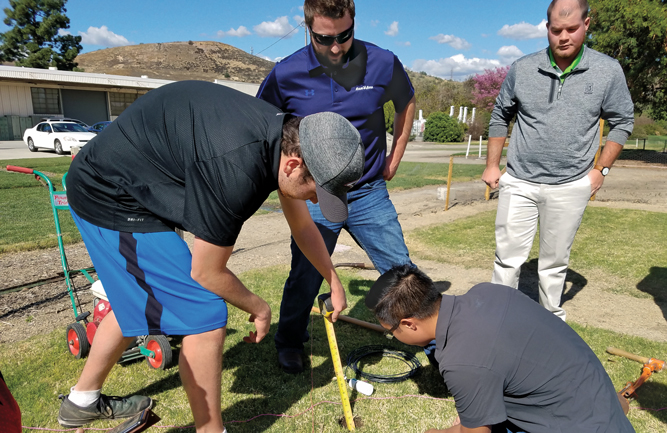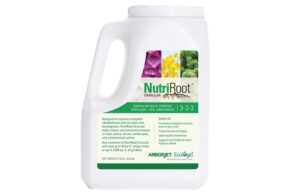Super Science Intro: Soil moisture sensor irrigation in Southern California
Reducing a few minutes of irrigation application per head on a golf course could significantly save water and energy costs. Irrigation scheduling using automated soil moisture sensors (SMS) can apply water more efficiently while providing good fairway playing conditions.
Researchers at California State Polytechnic University evaluated SMS systems to reduce the number of irrigation cycles or water applied while maintaining acceptable turfgrass quality compared to traditional time-based irrigation scheduling on fairways.
GN-1 hybrid bermudagrass plots (each 10 feet by 10 feet) were sodded in 2012 and separated by 3-foot buffers. Three different soil moisture sensors (Toro, Rain Bird and Tucor) were installed and compared to a control treatment (no SMS). The control plots were irrigated based on the ET value collected from California Irrigation Management Information System (CIMIS) station No. 78.

Students install a Rain Bird Integrated soil moister sensor in the bermudagrass fairway plot. (Photo courtesy of Priti Saxena, Ph.D.)
The completely randomized experiment had three replications of individually zoned plots with a rotating sprinkler at each of the four corners. Plots were double cut at 0.5 inch in opposing directions twice a week using a Tru-Cut walk-behind reel mower. The plots were verticutted in the fall, and adequate fertility was maintained throughout the experiment.
The researchers collected data from the beginning of April through the end of October 2018, 2019 and 2020. Each year, the study started with all plots at similar water content (field capacity).
The irrigation information recorded for each plot included run time (minutes) by week, month and season, irrigation applied, amount of irrigation saved (actual amount and as a percentage of no SMS control), visual turfgrass quality, density, color ratings, clipping yield and soil salinity (bulk electrical conductivity).
In spring 2020, all the sensors showed a reduction in water applications compared to the control. In summer 2020, the water saved was more for Toro and Turcor sensors. Rain Bird treatment applied slightly more water than ET-based irrigation.
The results demonstrate that run times of soil moisture sensors were less than ET-based control plots. The SMS effectively reduces irrigation water used to maintain fairway turf quality and density under the Southern California study conditions.
Additional Information
Saxena, P., R. Green, E. Vis, and V. Mellano. 2020. Soil moisture sensor irrigation scheduling in bermudagrass [Cynodon dactylon (L.)] fairways. USGA Turfgrass Environ. Res. Summ. p. 204-207.









